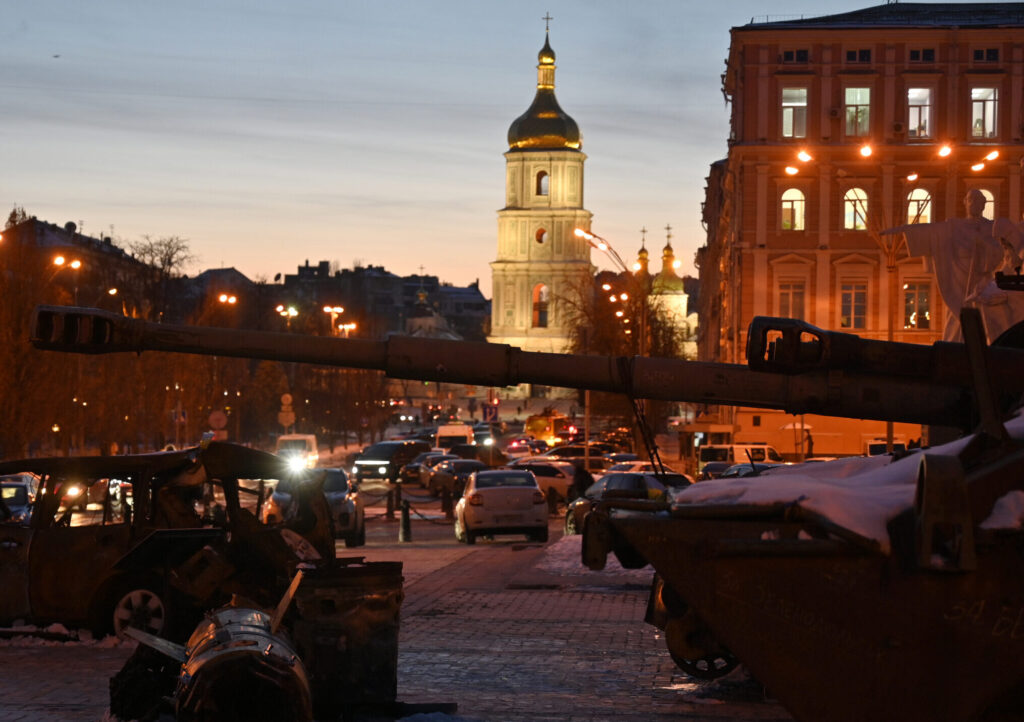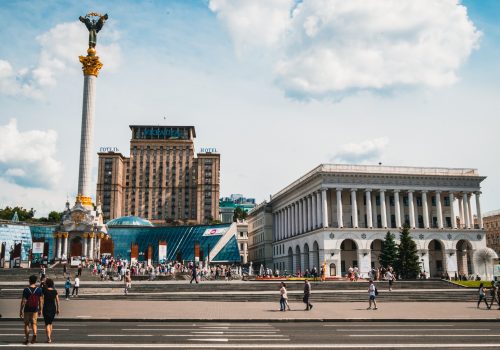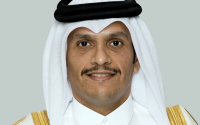
Wartime Ukraine ranks among world’s top performers in anti-corruption index

Ukraine recorded solid progress last year in its long struggle with corruption, according to the latest edition of Transparency International’s Corruption Perceptions Index. Wartime Ukraine climbed twelve places in the 2023 edition of the annual survey to rank 104th among 180 featured countries, increasing its anti-corruption score from 33 to 36 out of 100. “Ukraine’s growth by three points is one of the best results over the past year in the world,” noted Transparency International in the report accompanying the new edition of the ranking, which was released on January 30.
Ukraine’s strong performance in the authoritative anti-corruption ranking places the country alongside Brazil and ahead of fellow EU candidate nations Bosnia and Herzegovina and Turkey. Meanwhile, Russia continues to lag far behind, having dropped down a further two places in the 2023 index to occupy 141th position with just 26 points.
This year’s result is recognition for Ukraine’s ongoing anti-corruption efforts since the 2014 Revolution of Dignity. On the eve of Ukraine’s landmark pro-democracy uprising, the country languished in 144th place in Transparency International’s annual ranking. Following the Revolution of Dignity, the Ukrainian authorities have taken a number of steps against corruption including establishing a new anti-corruption architecture, embracing digitalization, and conducting ambitious reforms in key sectors such as government procurement, banking, and energy. Success has often been patchy, but the overall picture is one of unmistakable improvement that has allowed Ukraine to climb forty places in the anti-corruption index over the past decade.
Ukraine’s most recent progress is all the more notable as it has taken place amid the existential challenges of Russia’s ongoing invasion. While this has necessitated a range of wartime governance and security measures, anti-corruption efforts have continued. “The active work of Ukraine’s anti-corruption and other public authorities resulted in a growth in the 2023 Corruption Perceptions Index even during the full-scale war,” Transparency International acknowledged.
Stay updated
As the world watches the Russian invasion of Ukraine unfold, UkraineAlert delivers the best Atlantic Council expert insight and analysis on Ukraine twice a week directly to your inbox.
Transparency International is not the only international body to positively assess wartime Ukraine’s anti-corruption credentials. The fight against corruption has long been a key issue in relations between Kyiv and Brussels, and has traditionally been viewed as an obstacle to further European integration. However, Ukraine’s reform efforts since the start of Russia’s full-scale invasion have helped convince European leaders to grant the country EU candidate status and begin official negotiations on future membership.
Speaking last summer, European Union Commission President Ursula von der Leyen singled out Ukraine’s efforts to advance the country’s anti-corruption agenda despite facing a uniquely challenging wartime environment. “I must say it is amazing to see how fast and determined Ukraine is implementing these reforms despite the war,” she commented. “They are defending their country and reforming.”
These positive appraisals by Transparency International and the European Union undermine the credibility of attempts by Russia and others to portray Ukraine as hopelessly corrupt. For many years, Kremlin officials and regime propagandists have routinely depicted Ukraine as plagued by endemic corruption. This has been an important element of Moscow’s efforts to discredit Ukraine’s democratic transition, deter international support, and even mute criticism of Russian intervention.
Since the start of the full-scale invasion, Vladimir Putin himself has often referenced the alleged excesses of Ukrainian corruption in his public speeches. In November 2023, he declared that “corruption in Ukraine is unmatched anywhere in the world.” This ignores the inconvenient reality that Transparency International actually rates Putin’s Russia as significantly more corrupt than Ukraine.
The argument that Ukraine is simply too corrupt to support has also entered the mainstream in the United States, where it is often repeated by opponents of further US military aid. These objections continue, despite unprecedented levels of institutional oversight and successive Pentagon probes confirming no evidence of corruption or the misuse of weapons.
Across the Atlantic, Russia’s few remaining friends in the EU have made strikingly similar claims regarding Ukrainian corruption. In December 2023, Hungarian Prime Minister Viktor Orban branded Ukraine as “one of the most corrupt countries in the world” while arguing against Kyiv’s further EU integration. Orban, who is regarded as Putin’s closest European ally, certainly speaks with authority when it comes to corruption. His own country, Hungary, occupied last place among EU member states in this year’s Transparency International ranking.
Eurasia Center events

In a sense, Ukraine is currently paying the price for the unenviable reputation it earned during the first few decades of independence, when corruption throughout state institutions was a far more pervasive problem than it is today. It is no accident that Ukraine’s two post-Soviet revolutions in 2004 and 2014 were both driven largely by public exasperation over widespread corruption, with millions of Ukrainians taking to the streets to vent their anger. Despite undeniable signs of progress over the past ten years, examples of institutional corruption continue to emerge, keeping the old cliches alive.
With Ukrainians now fighting for national survival and heavily reliant on international support, attitudes toward corruption have hardened further. This is fueling a climate of heightened scrutiny that has led to a series of high-profile scandals since the onset of Russia’s full-scale invasion. In summer 2023, President Zelenskyy dismissed dozens of regional military enlistment officials on charges of bribery. Perhaps the most prominent scandal involved former Ukrainian Defense Minister Oleksiy Reznikov, who was forced to resign following claims of corruption within the ministry. Most recently, Ukraine’s State Security Service detained five people accused of conspiring with Defense Ministry officials to embezzle $40 million meant for the purchase of arms.
While these recent corruption scandals demonstrate that Ukraine still has a long way to go, it is worth emphasizing that they only came to light thanks to the investigative efforts of Ukraine’s own state organs and the country’s vibrant civil society. This vigilance should come as no surprise. After all, nobody is more conscious of their country’s corruption problems than Ukrainians themselves.
There is no doubt that today’s Ukraine continues to face serious corruption challenges. However, depictions of the country as irredeemably corrupt are false and misleading. The real story here is of a nation steadily emerging from centuries of imperial oppression and decades of dysfunction, with the current generation of Ukrainians determined to rid themselves of a corruption culture that is one of the most unwelcome legacies of this troubled past. Indeed, the fight against corruption is widely recognized by Ukrainians as an essential element of their country’s transformation toward a European future.
This year’s Transparency International ranking is a timely reminder that Ukraine is actually making meaningful progress in its historic struggle against corruption. While much remains to be done, the country is clearly moving in the right direction. Ukraine’s international partners are right to expect maximum accountability, but there are currently no grounds for abandoning Ukraine based on claims of corruption that are both exaggerated and outdated.
Peter Dickinson is editor of the Atlantic Council’s UkraineAlert service.
Further reading
The views expressed in UkraineAlert are solely those of the authors and do not necessarily reflect the views of the Atlantic Council, its staff, or its supporters.

The Eurasia Center’s mission is to enhance transatlantic cooperation in promoting stability, democratic values and prosperity in Eurasia, from Eastern Europe and Turkey in the West to the Caucasus, Russia and Central Asia in the East.
Follow us on social media
and support our work
Image: Open-air exhibition of destroyed Russian military equipment in the center of Kyiv. (Photo by Sergei Chuzavkov / SOPA Images/Sipa USA)





